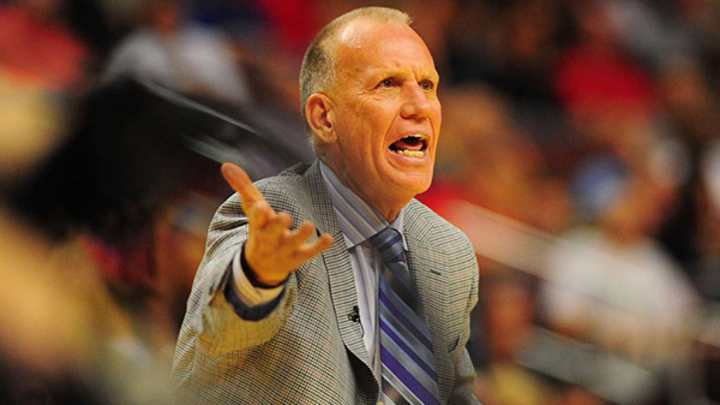Doug Collins Q&A: Coaching landscape, Steve Kerr's future, Clippers and more

Doug Collins played in the NBA for eight years and served as a head coach for 11 more. (Al Tielemans/SI)

SI.com recently caught up Doug Collins, the longtime player, coach and current ESPN broadcaster, to discuss the current state of NBA coaching as well as some of the league's most notable vacancies. Collins also discusses Mark Jackson's firing, Steve Kerr's fit with the Knicks, how Doc Rivers has handled the Donald Sterling controversy and whether he has truly given up head coaching for good. Collins talked to SI after speaking at an event with his son, Chris Collins, at Northwestern's Medill School of Journalism.
SI.com:Mark Jackson was fired on Tuesday. You were in a similar situation when you were fired from the Bulls in 1989 after leading Chicago to the Eastern Conference Finals. What do you make of a situation like this, in which Jackson leads his team to a 51-win season, the best they’ve had in 20 years and still ends up getting fired?
Doug Collins: The business is getting tougher and tougher. I think that you understand it as a coach. I think the hardest thing probably now you’re seeing more than ever is it’s not always just based on results. I think Jeff Van Gundy said it: It used to be a results-oriented business. Now as much as anything, it’s a relationships kind of thing. I just saw Mark recently the other day, and I talked to him about what a wonderful job he’s doing. And the only thing you could ever do in this business of coaching is to do your best. I said, “If you do your best -- even if it doesn’t work out there -- somebody else is going to want you.”
ROUNDTABLE: Who is the best available NBA head coach?
He’s going to land on his feet. I’m sure right now it’s a very painful (time) for him. But you look at last year, there were 13 new coaches in the NBA. I’m sure there are going to be four or five or six more this year. And we’ve become very much a quick-fix business. It’s a different time. And it’s hard -- there’s a lot of scrutiny -- but you sort of understand that when you get in the business. It doesn’t take the sting away, and I wish I could put my arm around Mark Jackson and give him a hug and let him know he did a good job. Once you’re in the coaching fraternity, you have a tremendous amount of respect for people who go through that.
SI.com: Recently there has been somewhat of an influx of inexperienced coaches into the league. Jason Kidd, as one notable example, made his debut with Brooklyn this year, and Steve Kerr’s name has been thrown around as a possible candidate in New York and elsewhere. What sort of learning curve exists from your perspective for individuals who haven’t coached in the past?
Collins: The one thing you do is you make sure you surround yourself with people who have experience. You know what your strengths are, and you make sure that whatever your weaknesses are you maximize yourself by putting those people of strength around you. There’s a real trust factor that goes into it. That coach’s locker room becomes a very sacred place where you’ve got to be able to talk about tough things. You’ve got to be able to argue. But when you leave, [you’re] all on the same page and this is the way you’re going to teach things and this is the way you’re going to do it.
McCANN: Sterling's next move? Delay, delay, delay
I used to have an expression: agree, disagree but align. You and I can agree, we can disagree, but when we walk out there, we’re in alignment that this is how we’re going to do things. Steve is very smart. Wherever he lands, he’s going to do an incredible job I’m sure. There will be a learning curve. You sit there on that bench for the first time, that game is really fast. And then all of the sudden it starts slowing down a little bit for you. And the one thing you have to do is you have to put really good people around yourself. You’ve got to trust your own instincts.
I think you saw that with Jason Kidd. Jason, for it to change he had to say, “I have to do it the way I want to do it.” And he had hired Lawrence Frank to come in, and I think there were a lot of voices that were in Jason’s ear and I think he finally just said, “I’ve got to trust my own instincts.” There’s not enough time for committee meetings during the course of the game. You’ve got to operate on the fly.
Doug Collins on Doc Rivers' ability to establlish trust "No one does that better than Doc."(Jesse D. GarrabrantNBAE/Getty Images)

SI.com: You’ve been around NBA locker rooms for decades. What do you think it says about the job Doc Rivers has done as coach for the Clippers that he has been able to lead that team -- amid the Donald Sterling saga -- past a tough Warriors team and into the second round?
Collins: When you talk about relationships, to me number one is trust. Obviously he built a tremendous amount of trust up with this team. They believe in him. And then there’s truth. Can you speak the truth? And that’s the essence of any relationship. In that locker room, the trust factor and then speaking the truth: No one does that better than Doc.
It’s tough enough to manage the emotional roller coaster of the NBA playoffs without throwing in the crisis and the firestorm they were thrown in that they shouldn’t have to be a part of. They were not a part of that. But they became part of it because of what was going on. And they had their one moment in Game 4, when you saw it took an incredible emotional toll on them. They had nothing. They were not there. Doc [rallied] those guys -- to come home in Game 5 [and win], then lose a one-point game in Game 6, then you come home [with] all the pressure [and win].
RELATED: Sterling denies being a racist in new recording
That team won 56 games last year and they were in the first round of the playoffs. They brought Doc Rivers in. What he did not only with the team (after the Donald Sterling tapes became public), but with the employees -- he went and spoke to them -- I bet you Doc didn’t sleep six hours in three nights. But what he brought in terms of leadership should be a blueprint for people in a situation where you’re being judged on your results of playing, but also how you rally everybody to go out and play for an organization where the team’s owner said some outrageous things. That’s tough.
SI.com: There are a number of intriguing vacancies in the league right now, including the Knicks, Lakers and now the Warriors. Out of all those destinations, which do you think is the most attractive for potential candidates?
Collins: It’s different for every person. What might attract Steve Kerr to New York might not attract me. The attraction for Steve Kerr to New York is the ability to be with Phil Jackson. Steve said the other day that if Phil weren’t there, they would have no interest in [him]. And [he] would probably have no interest in them. So every job is different based upon the dynamics of the ownership, how you would fit into that, what kind of team they have, what’s the short-term look of the team, what’s the long-term look of the team, what’s the cap situation. There are so many things that go into that.
Steve’s looking at New York as a place where maybe in the first year [they] can win X number of games, but you can keep Carmelo, you get guys off the cap next year, you’ve got Phil Jackson, you’ve got New York City, you can recruit, and you can be off and running. With Golden State, you’ve got a 51-win team, [Stephen] Curry, [Klay] Thompson, Draymond Green, [Andrew] Bogut: a team that’s now ready to win. Every team is different. And I think that’s why you have to pick and choose.
TAYLOR: Who do Warriors need? Someone like Mark Jackson
For instance, when Chris (Doug’s son and Northwestern head men’s basketball coach) was at Duke [as an assistant coach], a lot of these search firms tried to fix him with different schools. But it’s interesting: The schools they chose for Chris weren’t a good fit. He goes, “Dad, they’re trying to get me to go to [these schools] I’m not a fit for. Northwestern? I’m a fit.”
So every person is different. And you have to make sure that first and foremost you sit down with that owner and that general manager. And you have to get locked at the hip. That’s one thing I would like to see more of: If the general manager hires a coach, and he’s in love with that coach and the guy’s there three years and he didn’t make it, then to me the general manager has got to go too. Why can he stay? Why do they get eight years and a coach gets three? There’s got to be some more accountability there too.
SI.com: You’re pretty comfortable in the broadcast booth. But do you have any itch to get back to coaching?
Collins: No. I’m 62 years old. The league is changing, which is great. I’ve had a wonderful run: 40-something years, coaching four different teams, playing. I’m at a stage now where I’ve got five grandchildren I want to be around. I want to hang out with Chris. My son-in-law coaches high school in Philadelphia. I want to go and be part of his games. I’ve had my run. I’ve been selfish. It’s time for me to be more unselfish.
SI.com NBA playoff coverage
2014 NBA playoffs schedule, results | Series predictions| Season awards
PREVIEWS: Pacers-Wizards | Heat Nets | Spurs-Blazers | Thunder-Clippers
ROUNDTABLE:Best matchup of the second round? | Biggest disappointment
WATCH: Relive the best moments from the first round | Lillard’s series-winner
STERLING COVERAGE: Sterling, NBA set for epic legal battle | Impact on Clips?
